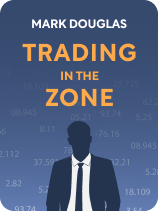

This article is an excerpt from the Shortform book guide to "Trading in the Zone" by Mark Douglas. Shortform has the world's best summaries and analyses of books you should be reading.
Like this article? Sign up for a free trial here .
What is your trading mindset? Do you focus more on minimizing risk or maximizing gains?
In trading, mindset is extremely important. Most people embody a fear-based mindset when trading, focusing on avoiding risk. To achieve consistent success, we need to train ourselves to think differently and embody the winning mindset, focusing on gains.
Keep reading to learn about the role of mindset in trading.
A Clear Goal Focused on Winning Consistently
First, Douglas says you need to decide with absolute certainty that what you desire more than anything else when you trade is to win consistently. You have to desire consistency to such an extent that you abandon all other motivations for trading. Once you commit to this singular goal, you’ll willingly accept any outcome the market delivers without emotional distress or fear. Then, you’ll approach market activity not as a way to avoid pain or prove something but as a means to gain an edge and profit.
Douglas says overcoming fear may be faster and easier for some people. Why? People who’ve experienced childhood traumas may have more persistent fear. Also, people may have beliefs that conflict with accumulating wealth, such as the belief that having more money than others is selfish. Nevertheless, Douglas seems to say that everyone—through focused effort—can shift from negative, disempowering beliefs to optimistic, empowering beliefs that form the foundation of a winning mindset.
| Conflicting Views on How to Overcome Fear Can anyone eradicate fear independently through focused effort (and consequently approach trading with a healthy mindset), as Douglas seems to suggest? While some say it’s possible to conquer fear gradually over time, it can be hard to face (and overcome) deeply rooted fears on your own. Therefore, it’s often beneficial to seek professional help. Mental health experts attest that persistent fear generally requires dedicated time, energy, and often professional support to overcome. Psychologists use numerous therapeutic approaches to address people’s fears. For example, cognitive behavioral therapy involves helping patients gradually overcome fears by identifying and changing negative thought patterns over time. The more entrenched the fear, the longer it can take to resolve. |
Entering the “Zone” to Achieve Easy, Effortless Trading
Further, Douglas says, your ultimate goal as a trader should be to achieve consistent success as an automatic, free-flowing expression of who you are. Then, you can experience trading as easy, effortless, fun, and rewarding.
Douglas explains that you can’t force consistency or achieve it through effort. The very act of trying indicates that you’re resisting or struggling against something, or that you’re emotionally attached to getting something from the market. That inclination, though natural, is self-defeating. It ensures that you’ll continue to make fear-based errors.
(Shortform note: While Douglas says effort hinders consistency, many people offer actionable tips for improving trading consistency, implying that you can improve your consistency through effort. For example, trading experts suggest safeguarding your consistency by working to downplay your “herd instinct,” the impulse to follow the crowd and make trading decisions based on what others are doing. The urge to follow the crowd may seem safe, but this reactionary approach can lead to errant and unprofitable trading decisions, thereby sabotaging consistency. Instead, always make sure you base your trading decisions on a coherent strategy, not popular sentiment.)
However, when you’re simply open to whatever the market offers, you can spontaneously enter the “zone.” Douglas describes the zone as a state of mind in which you feel no fear and act intuitively without hesitating. When you’re in this state, your actions always generate a favorable result—without strain or conscious effort. Although Douglas says you can’t intentionally generate the in-the-zone trading mindset, you can set up the conditions for it to spontaneously emerge.
Trading in the zone, Douglas says, is similar to the experience many athletes describe when they spontaneously enter an inherently creative state while performing. While in that state, they perform with astounding proficiency—with an ease and effortlessness that seems almost impossible. They aren’t “trying,” weighing the consequences of their actions, or feeling any fear about messing up. Rather, they’re performing intuitively and seizing opportunities that present themselves moment by moment.
| Can We Enter the “Zone” at Will? Although Douglas says you can’t deliberately trigger a zone mindset, sports psychologists say that with systematic training using sports psychology techniques, anyone (not just athletes) can enter the zone almost at will. Here are some techniques you can use: – Create the right conditions. Psychologists agree with Douglas that creating the right mental conditions is critical to reaching a zone mindset. To create these conditions, make sure your skill and confidence levels match the challenge level of the task. Research shows that there’s an optimal level of anxiety at which we perform best, so a task must feel doable at the upper reaches of our ability to find a perfect location between boredom and anxiety. – “Park” your errors. When you make a mistake, symbolically “transfer” that mistake from yourself to an object: wipe away the error onto your shirt, scribble it out on your notepad, or shake it out through your limbs. This physical act can help you release anger and frustration and regain concentration. – Use self-hypnosis. Focus on the regularity of your breathing, repeat a mantra such as “relax,” or listen to music. The music can be upbeat and rhythmic, or more sedative, depending on what works better for you. Self-hypnosis helps limit conscious mental activities and tame anxiety. There are thus many factors you can control to enter the zone with more ease and frequency. However, it’s difficult—if not impossible—to eliminate distracting thoughts and emotions indefinitely. Therefore, you likely won’t be able to stay in the “trading zone” that Douglas describes indefinitely, but you can at least train yourself to reach that state more consistently. |

———End of Preview———
Like what you just read? Read the rest of the world's best book summary and analysis of Mark Douglas's "Trading in the Zone" at Shortform .
Here's what you'll find in our full Trading in the Zone summary :
- The role mindset plays in stock trading
- The critical importance of embracing risk
- How to become a confident, consistent winner






